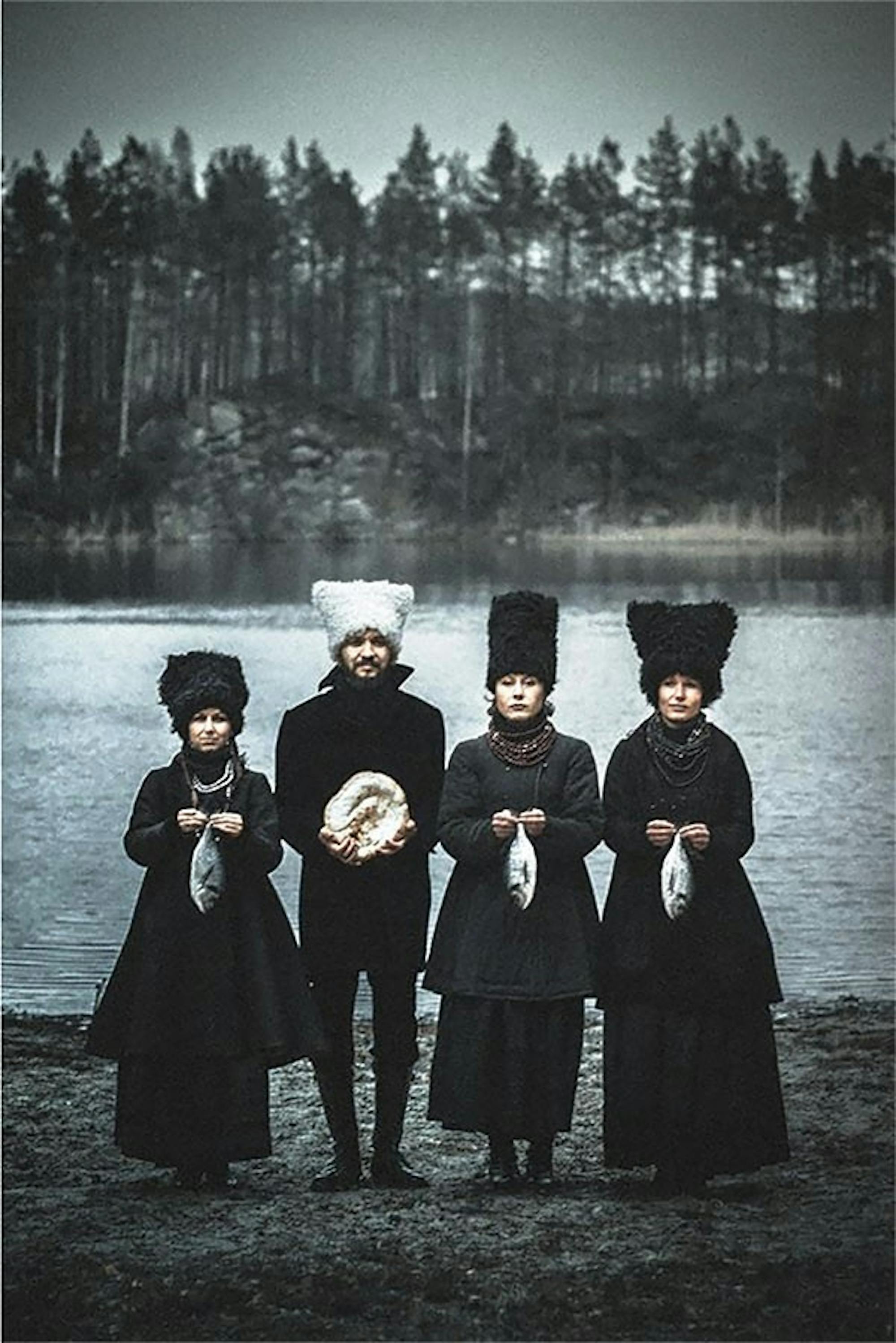DakhaBrakha, a world music quartet that will be performing at the Hopkins Center on Wednesday, has a sound that is rooted in traditional Ukrainian folk music, but is not limited by that genre — nor by anything else, it would seem. A surprise hit at music festivals such as Bonnaroo and GlobalFest and winner of the prestigious Sergey Kuryokhin Prize for Contemporary Art in 2010, DakhaBrakha describes itself on its website as an “ethnic chaos” group, a title that fits both its sound and aesthetic.
“They’re completely arresting to look at,” Hop programming director Margaret Lawrence said.
The tall wool hats, long white dresses and thick beaded necklaces that comprise their visually striking performance outfits do not identify the group as belonging to any single culture. Lawrence said to think of the group as art students; their costumes “are something they made up.”
“But it was their sound that really knocked my socks off,” Lawrence said.
DakhaBrakha is composed of four members: Marko Halanevych, Iryna Kovalenko, Olena Tsibulska and Nina Garenetska. Together, they create a tight vocal harmony through the use of an open-throated Balkan singing style, Lawrence said.
Dartmouth music professor Ted Levin said that their heavily percussion-based sound draws from traditional African drumming. The band’s website also lists influences from Indian, Arabic, Russian and Australian styles. Typically, the performances feature a cello or an accordion, and sometimes both, to accompany the percussion, but they can also use other string instruments, according to their website.
“The fun of them is going and being ready for a total sonic experience that’s fun and high-energy,” Lawrence said. “They just totally whip up the crowd. It’s totally amazing.”
Andrew Sun ’18 of the College Folk Society seconds Lawrence’s opinion.
“DakhaBrakha is a very energetic group,” he said. “They bring in that theater piece to what they’re performing. They explore that intersection of theater and music.”
Sun said that folk music itself similarly aims to explore an intersection between music and community. The Folk Society in particular was formed recently with this goal in mind. Last term, the group’s founders recognized that despite the fact that many Dartmouth students have an interest in folk music, there was a lack of opportunities on campus for students to explore those musical interests in a group setting without the time commitment or experience level required by many of Dartmouth’s performance groups. The Folk Society aims to fill that void.
“There wasn’t really a place for people to come together and focus on group playing,” Sun said. “It’s really cool to see the kind of community that grows each week.”
Edward Darling ’19 says that this inclusive community is what drew him to join the Folk Society.
“I like how the musicians who play folk music are very casual and welcoming,” he said. “There is a whole culture around jamming in folk music.”
Jamming is a more improvisational style of music and players have to really listen to one another, Emily Charland ’19, a violin player in the Folk Society, said. She said that she rarely uses sheet music during songs.
“You play what sounds good with what’s going on with the rest of the music,” she said.
According to their website, DakhaBrakha’s name translates to “give-take” in an older version of the Ukrainian language. The name emphasizes the communal and relational aspect of folk music.
Additionally, DakhaBrakha’s melding of cultural elements is characteristic of a trend that is beginning to emerge in folk music everywhere, Sun said.
“Even American folk music is becoming more influenced by other world music,” he added.
Levin also pointed to this common thread in world music.
“World music performers draw from very eclectic sources,” he said. “It’s very evident that this group does that also. This mash-up of world traditions is what’s going on everywhere. The important lesson that we take away from this is that in music, nothing is pure.”
Levin also urges students to attend DakhaBrakha’s performance if possible.
“It’s very important to encourage this kind of art, this cross-cultural imagination,” he said.
Although the group is Ukrainian and speaks limited English, their performance at the Hop will be in English, Lawrence said. Additionally, local Ukrainians will act as their translators as they visit music classes on campus and conduct a question-and-answer session after their performance.
Lawrence said that DakhaBrakha is one of few groups that has no hesitations about visiting Hanover in the winter due to the similarities between New England and Ukrainian winters.
Darling noted that New England is one of the better regions in the country for bluegrass and folk music.
He said that this stems from the presence of immigrants from Scotland and Ireland, two birthplaces of folk music, in the Upper Valley and the agrarian nature of New England.
“Folk music is a very inclusive term,” Darling said. “It is basically just the traditional music of that particular culture.”
The universal nature of folk music makes it easy for many different people to enjoy, despite language or cultural barriers, Darling said.
Lawrence added that both Dartmouth and the Hop attract people from all cultures and backgrounds.
“That’s our experience at the Hop- it doesn’t matter where you bring an artist from, somebody is so overjoyed,” Lawrence said. “We find this to be true time and time again.”
DakhaBrakha will perform in Spaulding Auditorium on Wednesday at 7 p.m.




